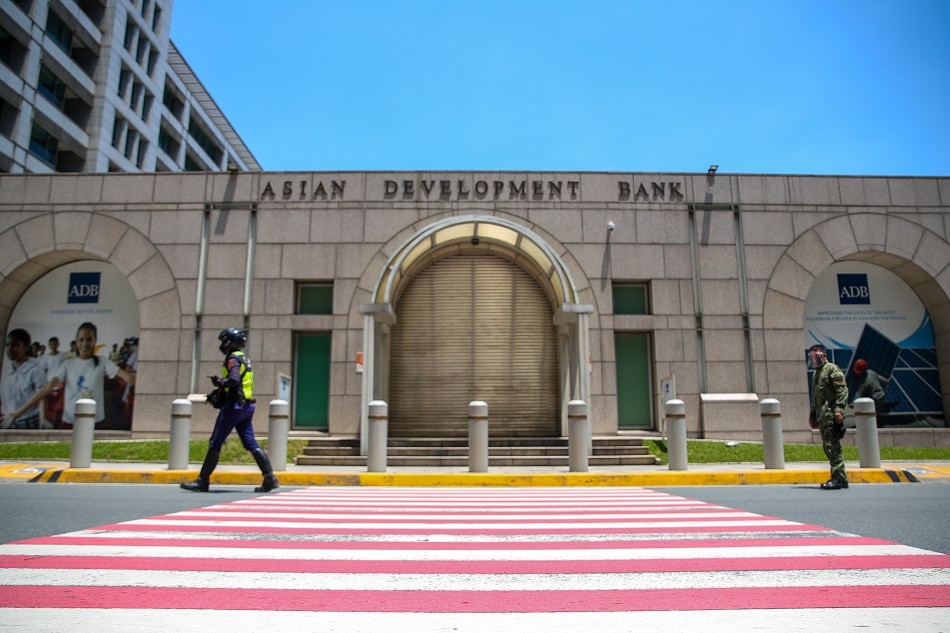ADB approves $400-million loan for Philippines | ABS-CBN
ADVERTISEMENT

Welcome, Kapamilya! We use cookies to improve your browsing experience. Continuing to use this site means you agree to our use of cookies. Tell me more!
ADB approves $400-million loan for Philippines
ADB approves $400-million loan for Philippines
John Gabriel Agcaoili,
ABS-CBN News
Published May 31, 2022 04:28 AM PHT
MANILA—The Asian Development Bank on Monday announced approving another $400 million (P20.9 billion) loan for the Philippines to help the country "further deepen its domestic capital markets and increase the supply of long-term finance."
MANILA—The Asian Development Bank on Monday announced approving another $400 million (P20.9 billion) loan for the Philippines to help the country "further deepen its domestic capital markets and increase the supply of long-term finance."
In a statement, the ADB said the policy-based loan, "Support to Capital Market-Generated Infrastructure Financing Program, Subprogram 2", will help the Philippines form an "efficient domestic debt market and increase institutional participation in the market, especially from insurance and pension funds."
In a statement, the ADB said the policy-based loan, "Support to Capital Market-Generated Infrastructure Financing Program, Subprogram 2", will help the Philippines form an "efficient domestic debt market and increase institutional participation in the market, especially from insurance and pension funds."
"More supply of long-term finance will help address the country’s infrastructure financing gap, estimated at roughly P2 trillion ($40 billion) a year up to 2030," the development bank said.
"More supply of long-term finance will help address the country’s infrastructure financing gap, estimated at roughly P2 trillion ($40 billion) a year up to 2030," the development bank said.
ADB principal financial sector specialist for Southeast Asia Stephen Schuster explained that the Philippines needed various sources of long-term financing to support the recovery of its COVID-hit industries. These include micro, small, and medium-sized enterprises (MSMEs) which are considered the backbone of the country's economy.
ADB principal financial sector specialist for Southeast Asia Stephen Schuster explained that the Philippines needed various sources of long-term financing to support the recovery of its COVID-hit industries. These include micro, small, and medium-sized enterprises (MSMEs) which are considered the backbone of the country's economy.
ADVERTISEMENT
The Philippines also requires funding to provide for "social protection and infrastructure development priorities", Schuster emphasized.
The Philippines also requires funding to provide for "social protection and infrastructure development priorities", Schuster emphasized.
“A deeper, more diversified investor base can help ease fiscal constraints," he said.
“A deeper, more diversified investor base can help ease fiscal constraints," he said.
The newly approved loan will help the Philippines to form "an enabling environment" that will attract long-term investors, the ADB said.
The newly approved loan will help the Philippines to form "an enabling environment" that will attract long-term investors, the ADB said.
"Pension funds and the insurance sector currently account for a small portion of the Philippines’ domestic capital market, with their combined volume equivalent to 12% of gross domestic product compared to 30% in Thailand and almost 80% in Malaysia. There is huge potential in tapping this sector for long-term funds since they have long investment horizons and low leverage," it noted.
"Pension funds and the insurance sector currently account for a small portion of the Philippines’ domestic capital market, with their combined volume equivalent to 12% of gross domestic product compared to 30% in Thailand and almost 80% in Malaysia. There is huge potential in tapping this sector for long-term funds since they have long investment horizons and low leverage," it noted.
"These investors can offer better debt pricing and longer maturities in local currency and are less likely to sell or retreat during short-term market corrections."
"These investors can offer better debt pricing and longer maturities in local currency and are less likely to sell or retreat during short-term market corrections."
ADVERTISEMENT
One of the Philippines' biggest financiers for development, the ADB has loaned the country billions of pesos worth of assistance since the COVID-19 crisis began.
One of the Philippines' biggest financiers for development, the ADB has loaned the country billions of pesos worth of assistance since the COVID-19 crisis began.
Last February, the financial institution released a study wherein it classified the Philippines as having “limited fiscal space” after the country’s debt level soared due to the pandemic.
Last February, the financial institution released a study wherein it classified the Philippines as having “limited fiscal space” after the country’s debt level soared due to the pandemic.
The Philippines ended 2021 with a debt of P11.73 trillion, but the country's debt ballooned to P12.68 trillion as of March 2022, according to the Bureau of Treasury earlier this month.
The Philippines ended 2021 with a debt of P11.73 trillion, but the country's debt ballooned to P12.68 trillion as of March 2022, according to the Bureau of Treasury earlier this month.
Recent borrowings brought the debt-to-GDP ratio to 60.5 percent in 2021 and 63.5 percent in March 2022, from 39.6 percent before the COVID-19 pandemic.
Recent borrowings brought the debt-to-GDP ratio to 60.5 percent in 2021 and 63.5 percent in March 2022, from 39.6 percent before the COVID-19 pandemic.
However, economic managers have argued that the current debt level remains manageable.
However, economic managers have argued that the current debt level remains manageable.
RELATED VIDEO
Read More:
Asian Development Bank
ADB
ADB loan
Asian Development Bank loan
Philippines loan
ADB Philippines
policy based loan
Philippine debt
ADVERTISEMENT
ADVERTISEMENT



